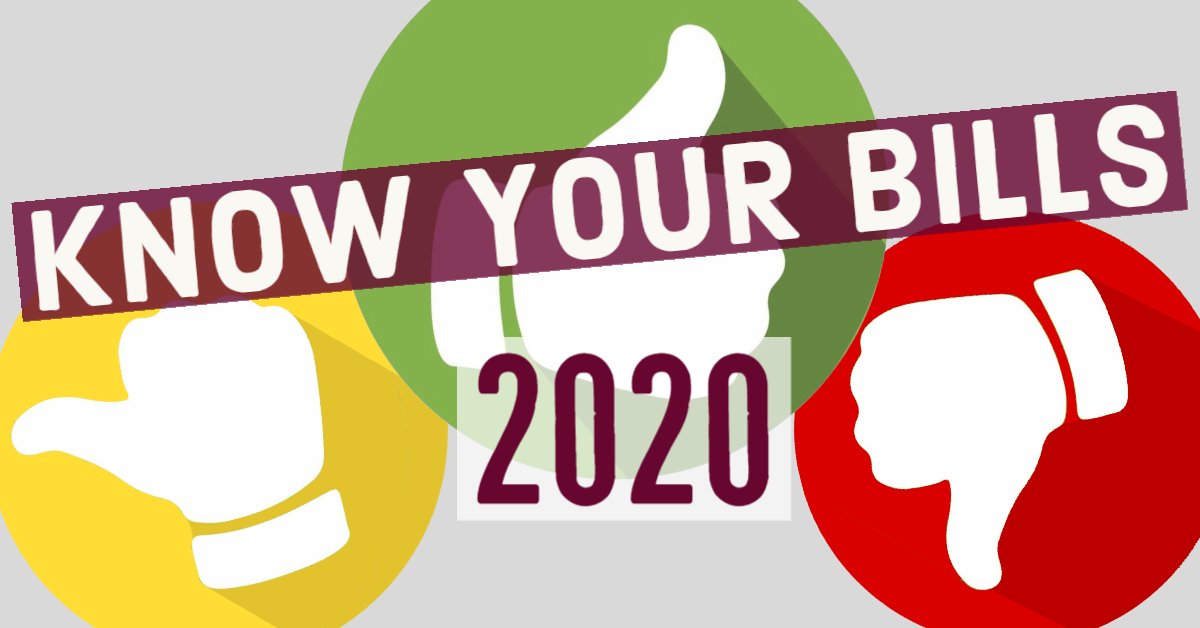Where AFSC-AZ stands on proposed 2020 Arizona criminal justice legislation.
| For | Neutral | Against |
|---|---|---|
 |    |        |
| (Good bill) | (Good idea / bad elements) | (Bad bill) |
The Bills
              | HB2808: prisoners; release credits. Increases earned release credits fro for people not convicted of a violent or aggravated felony per ARS 13-706 and who complete specific work or major programming in ADC. **An amendment was added that prevents Functional Literacy and GED classes from counting as programming for earning time. AFSC-AZ does not support this amendment.** Assigned to Senate Judiciary – awaiting committee hearing date. |
              | HB2893: sealing arrest; conviction; sentencing records. Allows the sealing of conviction histories after a certain period of time, and based on the following tiers: 1. TEN YEARS FOR A CLASS 2 OR 3 FELONY. 2. FIVE YEARS FOR A CLASS 4, 5 OR 6 FELONY. 3. THREE YEARS FOR A CLASS 1 MISDEMEANOR. 4. TWO YEARS FOR A CLASS 2 OR 3 MISDEMEANOR. AND 1. IF THE PERSON HAS ONE HISTORICAL PRIOR FELONY CONVICTION, AN ADDITIONAL FIVE YEARS. 2. IF THE PERSON HAS TWO HISTORICAL PRIOR FELONY CONVICTIONS, AN ADDITIONAL SEVEN YEARS. 3. IF THE PERSON HAS THREE OR MORE HISTORICAL PRIOR FELONY CONVICTIONS, AN ADDITIONAL TEN YEARS. A person whose record is sealed means their arrest, conviction, and incarceration information is not public record, but remains available to law enforcement and courts. Was not heard in committee, will not move forward in bill process. |
              | HB2236: deferred prosecution program; definition. Removes restrictions from deferred prosecution programs. Law currently allows prosecutors to prevent people who have previous or specific convictions from being able to avoid prison. Assigned to Senate Judiciary – awaiting committee hearing date. |
              | SB1171: criminal justice case information; reporting. Provides a detailed structure of criminal justice data that must be collected and made public by the Attorney General and County Prosecutors offices. Includes basic demographics and variables of prosecutors practices to understand where there may be biases in the system. This will help create better criminal justice policies. |
              | HB2250: grants; behavioral health treatment services. Establishes a community treatment and safety fund that will appropriate money for treatment to prevent incarceration, as well as after incarceration to help reduce recidivism. These funds are specifically allocated to the Department of Health Services, not the Department of Corrections. Awaiting committee hearing. |
              | HB2608: overdose and disease prevention programs; requirements; standards. Establishes harm reduction program for cities, towns, counties and NGOs that would provide needle exchanges, overdose prevention and peer support services, while reducing the risk of needle stick injuries to law enforcement. Assigned to Senate Health and Human Services committee – awaiting committee hearing date. |
              | HB2045: correctional health services; prohibited contracts. Prohibits the Arizona Department of Corrections (ADC) from contracting with private vendors to administer medical, mental health and dental care to incarcerated people beginning in June 2021 and transfers that responsibility back to ADC. |
              | HB2087 probation; technical violations; reinstatement Allows for a reinstatement of probation when a technical violation occurs (not a new crime) instead of revocation to prison. Assigned to House Judiciary on February 19th at 8:30am. |
              | HB2234: sentencing; aggravating circumstances Makes technical fixes to clarify the intent of the statute, but does not make a substantial change toward sentencing reform. Passed in House Judiciary on February 5th. Awaiting House Floor vote. |
              | HB2383: sentencing ranges; minimum; maximum; repeal Makes technical fixes to “clean up” sentencing ranges prescribed by statute, while maintaining existing minimum, presumptive, and maximum sentencing levels. Removes some language that prosecutors can use to more easily elevate a charge to aggravating. Assigned to House Judiciary on February 19th at 8:30am. |
              | HB2755: schools; drug violations; reporting options Allows school authorities to bypass law enforcement and instead move a student to a treatment program if they are caught with drugs in a drug free school zone. Assigned to House Judiciary on February 19th at 8:30am. |
              | SB1556 civil asset forfeiture; conviction; procedures Requires a person to be convicted, with exceptions, before property that is seized and subject to forfeiture may be forfeited and makes corresponding changes to judicial proceedings. Modifies permissible use of Anti-Racketeering Revolving Fund monies. Passed in House Judiciary on February 13th. Awaiting House Floor vote. |
   | HB2069: corrections oversight committee; ombudsman; duties. Good: Establishes a much-needed oversight committee to hold ADC accountable. Bad: Includes ADC director and excludes directly impacted people. Was not heard in committee, will not move forward in bill process. |
       | HB2036: fentanyl; heroin; carfentanil; mandatory sentencing. Establishes 10- and 15-year mandatory minimum sentences for people who sell heroin, fentanyl, and other opioids. It removes options for probation and community treatment, and does not allow judicial discretion. This bill is currently held, but may reappear in the Senate. |
       | HB2140: prisoner injuries; monetary judgments; reimbursement. Would require people who have been incarcerated to pay back medical care costs from their time in prison, even when the expense comes from negligence by the prison or their contracted labor company. If a person does not pay the fees they are at risk of being ineligible for rights restoration. Assigned to Senate Transportation and Public Service Committee- awaiting committee hearing date. |
       | SB1172: sex offender registration; requirements; vehicles. Increases surveillance forms for people who are convicted of sex offenses and reduces time period for people who are homeless to re-register from every 90 days to every 30 days. Will be heard on Wednesday, March 18th, in the House Judiciary Committee. Call your Representative and tell them to VOTE NO on the floor! |
       | HB2299: unlawful food or drink contamination Makes it a Class 6 felony if someone does a stupid internet stunt. Passed in House Judiciary on February 5th. Awaiting House Floor vote. |
       | HB2538: health care workers; assault; prevention Increases punishment for assault charges when the incident occurs specifically with health care workers. Creates increased criminalization of vulnerable populations. Will be heard on Wednesday, March 18th, in the Senate Health and Human Services Committee. Call the committee and tell them to VOTE NO.d committee assignment. |
